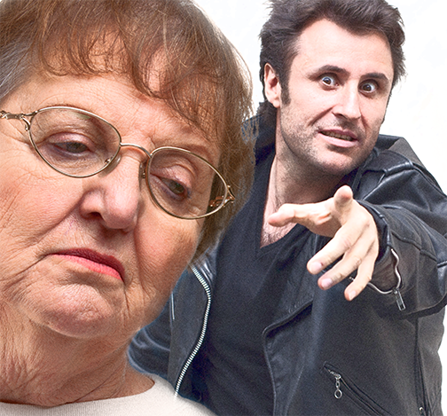The Chaotic Roller Coaster of Addiction
When you have a loved one who’s addicted to drugs or alcohol, very often your life becomes as chaotic and tumultuous as your loved one’s. It can even be worse if you have not yet realized that the source of the problem is addiction, because the chaos will roll on and on without any apparent cause. One of the hardest lessons a person must learn is to look beyond the lies and manipulation to identify the real source of the chaos.
One thing it’s important to learn is that there are different levels and forms of addiction. For some people, their addiction takes the form of weekend drinking binges that start Friday and end in the wee hours of Monday morning. For others, drugs offer a reliable refuge when they’re faced with difficult challenges which may occur weekly, monthly or just before deadlines. And others stay intoxicated from morning to night, seven days a week.
Unaddicted family members watching the parade of symptoms of this problem are ordinarily baffled and confused. Their loved one acts nothing like he or she used to. Only by understanding the phenomenon at work can they gain control of their lives and truly be able to help their loved one.
Here’s how to decipher the distinctive signs of an addicted person’s chaotic and hidden life.
(Please note: For simplicity, we will use “he” but of course, anyone can be addicted.)
1. His stories and excuses don’t add up.
Whatever’s gone wrong, he has an excuse for it. And the excuses are often plausible. The key thing to notice is that over time, all you are hearing is excuses and there’s no attempt to be honestly responsible for problems or failures. After you hear a dozen of them, they just don’t add up any more. That doesn’t stop him from offering even more excuses.
2. He suddenly picks fights and then takes off.

This phenomenon often blindsides the unaddicted family member. Things seem to be going fine when suddenly, he begins to pick a fight over little or nothing. Family may be baffled as the argument escalates. Finally, he takes off and is gone for hours or even a day or more.
3. He deflects blame. Always.
Drug use and excessive alcohol use eat away at a person’s moral strength. His own responsibility deteriorates, so naturally, he must blame others. However he has to manipulate the stories he tells, he’s going to put the blame on someone else for problems at work, school or home. He’ll often do it so skillfully that he is completely believable. Sometimes, deflecting blame means he accuses someone who’s just trying to find out what’s going on with him so he can be helped. This is very painful for concerned family members.
4. His performance on the job or at school will not be up to par.
This individual could have had years or even decades of stellar performance on a job or career. Or his schoolwork could have been top-notch for years. As drugs erode his ability to focus and think clearly, work and school performance will deteriorate. He will try to conceal the truth any way he can.
5. His health is suddenly unpredictable.
Hangovers, withdrawal sickness, infections, crashes after extended stimulant use, fatigue, incoherence, weight loss or gain, mysterious “colds” or “flu” – formerly robust health is replaced by a continuing series of ailments.
6. He’ll have money problems.
Drugs and alcohol cost plenty of money. The deeper the addiction, the more it costs. There will be money missing. Inquiries about missing money will wind up in arguments. He will accuse others of not trusting him, he’ll claim no knowledge, he’ll make excuses. He’ll deflect blame.
7. And of course, denial.
There’s no problem, it’s all in your head, why are you accusing him? He’s not (drinking/smoking/using) very much, he thinks better when he’s high, it’s just how he deals with stress – it goes on and on. The key is that he never takes a good hard look at his life and how he can make it better and improve the lives of those around him.
When you are living in this kind of chaos, your loved one needs effective rehabilitation to get his (or her) life back on track. For fifty years, Narconon has been helping replace the chaos with responsibility and productivity.


